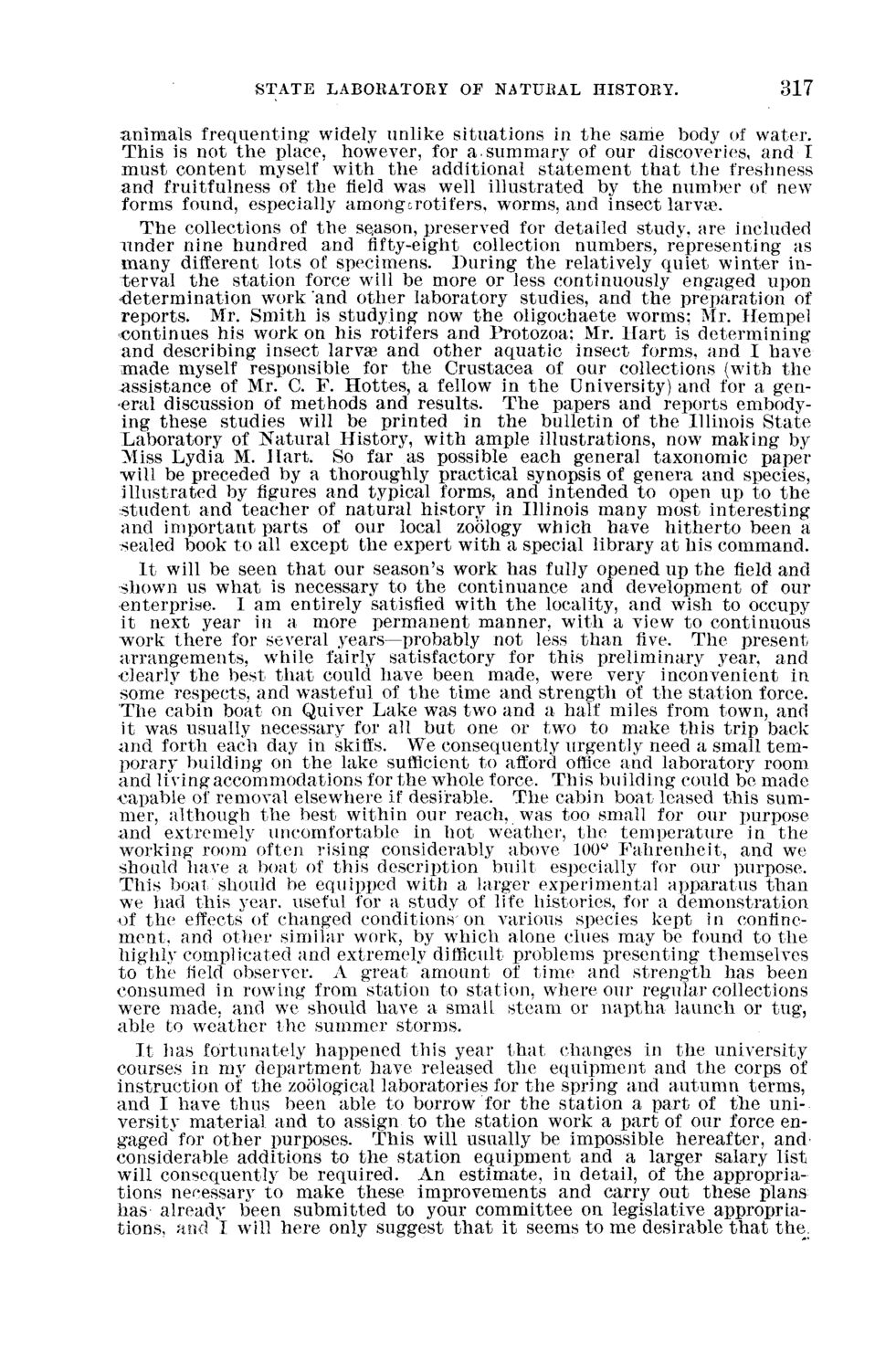| |
| |
Caption: Board of Trustees Minutes - 1894
This is a reduced-resolution page image for fast online browsing.

EXTRACTED TEXT FROM PAGE:
STATE LABORATORY OF NATURAL HISTORY. 317 animals frequenting widely unlike situations in the same body of water. This is not the place, however, for a.summary of our discoveries, and I must content myself with the additional statement t h a t the freshness and fruitfulness of the field was well illustrated by the number of new forms found, especially amongcrotifers, worms, and insect larva?. The collections of the se,ason, preserved for detailed study, are included under nine hundred and fifty-eight collection numbers, representing as many different lots of specimens. During the relatively quiet winter interval the station force will be more or less continuously engaged upon determination work and other laboratory studies, and the preparation of reports. Mr. Smith is studying now the oligochaete worms; Mr. Hempel continues his work on his rotifers and Protozoa; Mr. Hart is determining and describing insect larva? and other aquatic insect forms, and I have made myself responsible for the Crustacea of our collections (with the assistance of Mr. C. F. Hottes, a fellow in the University) and for a general discussion of methods and results. The papers and reports embodying these studies will be printed in the bulletin of the Illinois State Laboratory of Natural History, with ample illustrations, now making by Miss Lydia M. Hart. So far as possible each general taxonomic paper will be preceded by a thoroughly practical synopsis of genera and species, illustrated by figures and typical forms, and intended to open up to the student and teacher of natural history in Illinois many most interesting and important parts of our local zoology which have hitherto been a sealed book to all except the expert with a special library at his command. I t will be seen t h a t our season's work has fully opened up the field and shown us what is necessary to the continuance and development of our enterprise. I am entirely satisfied with the locality, and wish to occupy it next year in a more permanent manner, with a view to continuous work there for several years—probably not less than five. The present arrangements, while fairly satisfactory for this preliminary year, and clearly the best t h a t could have been made, were very inconvenient in some respects, and wasteful of t h e time and strength of the station force. The cabin boat on Quiver Lake was two and a half miles from town, and it was usually necessary for all but one or two to make this trip back and forth each day in skiffs. We consequently urgently need a small temporary building on the lake sufficient to afford office and laboratory room and living accommodations for the whole force. This building could be made -capable of removal elsewhere if desirable. The cabin boat leased this summer, although the best within our reach, was too small for our purpose and extremely uncomfortable in hot weather, the temperature in the working room often rising considerably above 100° Fahrenheit, and we should have a boat of this description built especially for our purpose. This boat should be equipped with a larger experimental apparatus than we had this year, useful for a study of life histories, for a demonstration of the effects of changed conditions on various species kept in confinement, and other similar work, by which alone clues may be found to the highly complicated and extremely difficult problems presenting themselves to the field observer. A great amount of time and strength has been consumed in rowing from station to station, where our regular collections were made, and we should have a small steam or naptha launch or tug, able to weather the summer storms. I t has fortunately happened this year t h a t changes in the university courses in my department have released the equipment and the corps of instruction of the zoological laboratories for the spring and autumn terms, and I have thus been able to borrow for the station a part of the university material and to assign to the station work a part of our force engagedfor other purposes. This will usually be impossible hereafter, and considerable additions to the station equipment and a larger salary list will consequently be required. An estimate, in detail, of the appropriations necessary to make these improvements and carry out these plans has already been submitted to your committee on legislative appropriations, and I will here only suggest t h a t it seems to me desirable t h a t the.
| |